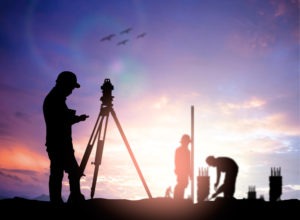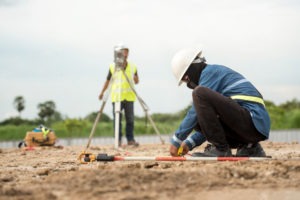
The kind of land survey you need to do depends heavily on the type of project you’re doing. A survey for construction on land with lots of elevation may require a land survey. If you’re having a dispute with boundaries and encroachment, a boundary survey is necessary.
There are many types of land surveys available, and each one focuses on specific land concerns. Our professional land surveyors will help you get started. If you need help deciding what kind of survey you need, our team here at Scalice Land Surveying has answers.
What Is a Land Survey?
A land survey is a professional, official way to measure and locate different features of a piece of property. Land surveyors evaluate boundaries, structures, utilities, and more to show landowners, buyers, sellers, and any other interested parties what lies on a parcel of land.
To conduct a land survey, professionals usually go through three stages:
Preliminary Research
Before even stepping foot on your property, your surveyor will conduct research on the history of your land and the properties that border it. They’ll look at past surveys, historical documents, and other resources that give them a good idea of what they’re getting into before they start measuring your land.
In many cases, you can cut down on the amount of time it takes for your surveyor to do primary research by providing any documents you have. In some cases, there may also be a form that you can fill out that outlines what is on your land and what aspects of it you need to be surveyed.
Fieldwork
This is the part of the land survey process that most people are familiar with. After they’ve finished their preliminary research, your surveyors will set out onto your land with instruments that help them measure the aspects of your property that you need to know.
Depending on the size of your land and the type of survey you need, the fieldwork stage can be brief or take a long time to complete. When you talk to one of our survey experts, they’ll listen to your needs and tell you what the time frame might be.
Computation and Drafting
After a surveyor has gathered all the data they need, they’ll return to their office to process it. Your engineer will draft up a survey plan and crunch the numbers so that you can understand the results of your survey.
This is often the longest part of the survey process, as some jobs require extensive documentation. The more experienced the surveyor and the more advanced their equipment, the easier it will be for them to get results.
What a Land Survey Will Tell You
When you get the results of your land survey, you’ll ideally be able to see any information that you need to know for whatever project you’re planning. However, different types of land surveys show different information and may result in different data, plans, and drafts.
In general, land surveys will tell you:
- Where your property’s boundaries meet those of the neighboring property
- If the legal description of the property is accurate
- Where any easements, rights of way, or other public access points are located
- If there are aspects of your property that have not been documented or have been overlooked in past surveys
Much of this information is crucial when buying or selling. If there is a legal issue with your property, it could not only present problems for the owner down the road, but could also scare off future lenders or buyers.
Why You Should Get a Land Survey
There are plenty of reasons to get a land survey. In many cases, someone will tell you that you need one for a transaction or contract. In those cases, they’ll also most likely tell you what kind of land survey you need.
Common instances that property owners need land surveys for include:
Buying or Selling
If you’re buying or selling a property, chances are likely you’ll need a land survey. Buyers should always know what they’re getting into–there could be hidden utility risks that aren’t immediately apparent. You don’t want to discover those after you buy the property.
Even if the property is totally undeveloped and empty, you should get a land survey. There could be boundary issues, flood risks, or even public access points called easements where people can legally enter your property.
If you’re selling, you should also get an updated survey. In many instances, having a land survey is required before you close your deal.
Refinancing or Getting a Mortgage
Often, lenders and mortgage brokers will want to know all the risks that come along with your property. This can be flood zones, easements, utilities, or any number of factors that could affect their investment. If you’re getting a loan for your property, you should get a thorough survey.
Starting a New Project
If you’re thinking about building or excavating on your property, you may want to get a new survey. Not only can you make sure you’re not encroaching on neighboring properties, but you can also get topographic readings and even projections of what your new project would look like and how it would interact with your land.
If you’re not sure whether it’s worth getting a land survey, you can always talk to someone from our company who can assess your situation. One of our experts can tell you what you need for your sale, project, or any other situation you may find yourself in.
Types of Land Surveys
Not every survey is equal. Some types tell you certain information that others might not, and some are more thorough and comprehensive than others. The various types of land surveys you can get done depend on the type of project you have, and those include:
ALTA/NSPS Land Title Survey
This land survey is the most intensive and detailed. An ALTA/NSPS land title survey is necessary for when you buy or sell any commercial or private property. ALTA stands for the American Land Title Association, and NSPS stands for National Society of Professional Surveyors.
This land survey is named after these organizations because it follows ALTA and NSPS standards. An ALTA/NSPS land survey typically includes in-depth surveying for:
- Boundary lines
- Ancillary building locations
- Locations of easements
- Location of the main building and any improvements
This survey will ensure that there are no issues with encroachment or any other legal disputes. It also provides all the necessary information about the land to any seller or a potential buyer.
Boundary Survey
A boundary survey is very basic. Think of it as a less intensive form of an ALTA/NSPS survey. A surveyor will do basic fieldwork on the land to formally establish where the property lines are, where the building is located, and any structures surrounding it. Usually, you use boundary surveys to prevent any future legal disputes.
Subdivision Survey
If you’re trying to split up a large chunk of land into separate lots, you’ll need to conduct a subdivision survey. A subdivision survey is vital for:
- Zoning regulations
- Setback rules
- Street and drainage design
A subdivision survey is required with your local government. Subdivision surveys typically involve documenting the location, mapping out property lines, and measuring distances. Once the subdivision survey is completed, a comprehensive map and report will be submitted to both you and the city.
Topographic Survey
A topographic survey involves measuring the elevation of the land. Whereas other surveys typically only provide horizontal measurements, topographic surveys illustrate contour lines. Topographic surveys are important for:
- Road and bridge construction or improvement
- New construction or remodeling projects
- Drainage systems
- Landscaping projects
Using GPS and other high-quality equipment, your surveyor will analyze the terrain and provide a detailed report with digital elevation models that show how the topography of the land will potentially impact your project.
This may seem like too much information for you to factor into your decision. If you’re overwhelmed or have any questions about what information the various types of land surveys provide, you can always talk to someone from our company for free. A land surveyor will be able to help you decide.
Are Land Surveys Optional?
Land surveys aren’t optional. They are required to ensure that your project complies with state and local regulations. If you’re doing any sort of construction work, environmental restoration, buying property, or settling a land dispute, you’ll need to get a land survey done.
Depending on where you live and what you’re doing on your land, there may or may not be a specific kind of survey that you need to complete. Check your local regulations or talk to a professional surveyor about what you need to do.
What Kind of Survey Should I Get?
No two jobs are exactly the same, and some sales, contracts, and projects may require different information from others. That’s why it’s best to consult with an expert about what survey you need before you make a decision. However, there are some situations that tend to warrant one type of survey over the others.
For example, if you’re buying or selling land, an ALTA/NSPS land title survey tends to be the best bet for a thorough evaluation of boundaries, utilities, and easements. If you’re building or landscaping, though, a topographic survey is usually the way to go.
You should also consult with any buyers, sellers, or lenders involved with your project. Parties requesting surveys often have a certain type in mind. You don’t want to come up with less information than they need or overpay for a survey that shows more than they require.
Can I Conduct a Land Survey on My Own?
Even if you have the knowledge and tools to conduct a land survey, you shouldn’t do it on your own. The reason is that professional land surveyors are licensed and certified to carry out the job they do. If you provide your own land survey, it may not even qualify if you lack the proper qualifications.
According to N.Y. Educ. Law § 7209, only licensed surveyors are allowed to conduct land surveys. By law, they must complete training requirements and rigorous education to protect consumers’ best interests.
How Much Will a Land Survey Cost Me?
Land surveys, on average, cost several hundred dollars to complete. It can cost around $500 or more to complete a survey for a small- to medium-sized area. There are various factors that determine price, including:
- Size of the land
- The number of properties on the land
- What kind of survey you need
- How much time it takes
Remember, these are simply just general estimates. There’s no accurate way to tell how much your land survey will cost unless you first consult with a land surveyor. Our experienced land surveyors can provide you with a free estimate on your next project.
Talk to a Professional Land Surveyor Today
Land surveying is mandatory and requires lots of time, effort, and tools. Get your land surveyed by professionals that are licensed, certified, and dedicated. Don’t waste any time getting things done by talking with a land surveyor from Scalice Land Surveying today.
Call us or contact our team online to talk to an expert and get a FREE estimate. Someone from Scalice, P.C., is on call to talk to you about your next project.



